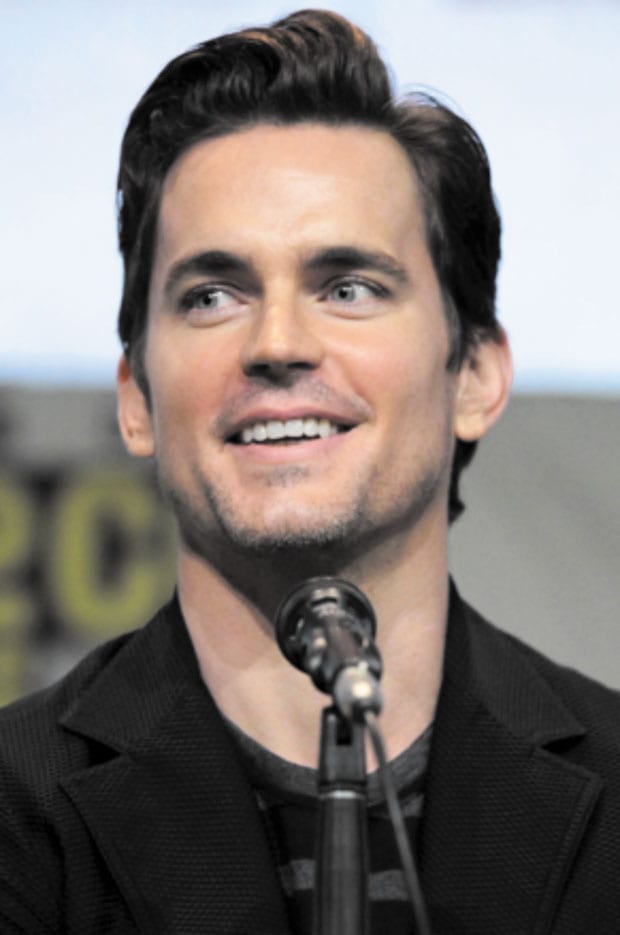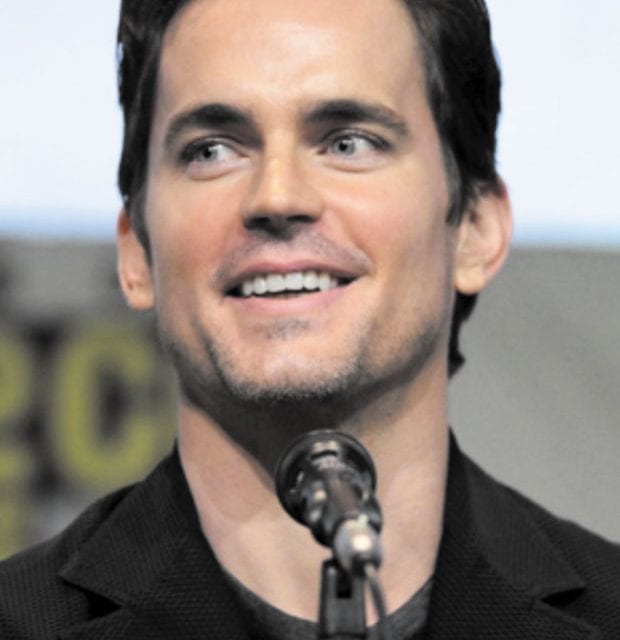
Matt Bomer
NEWS ANAlysis By Brent Paxton
nash@dallasvoice.com
Some people in the transgender community are upset that openly gay actor Matt Bomer has been cast as a transwoman in the upcoming film Anything.
The Mark Ruffalo-produced picture is an adaptation from Timothy McNeil’s play of the same name. In the story, Bomer’s character strikes up an unlikely friendship with a suicidal southern widower, played by John Carroll Lynch. The two grow very close as they attempt to reconcile their vastly different backgrounds.
So, what’s all the fuss about? It sounds harmless, right?
Well … .
If you’re familiar with the controversy surrounding Jared Leto’s casting as Rayon, an HIV-positive transwoman, in the 2013 film Dallas Buyers Club, then you’re all too familiar with why some in the trans community are not particularly happy. The issue is that such casting leaves us asking the most glaringly obvious question: With all of the trans actors out there, why not cast trans actors to play trans roles?
That’s a very good — and seemingly simple — question. If we lived in an idealistic society were everyone (including audiences) were fully evolved and informed on this issue, the filmmakers might respond with something like, “Of course we should have cast a transwoman. Just what were we thinking? We’ll do better next time.”
But in reality, the answer isn’ so simple, and the filmmakers likely did have a very real and very honest conversation about casting a transwoman in this role. It would be a disservice to over-simply this issue and paint this film as yet another example of society holding the trans community back.
Here’s why.
The entertainment industry has a long history of portraying minorities using non-minority actors, usually straight white male actors. Men portrayed woman in Shakespearian times and, long before that, in Ancient Greece. Women simply weren’t allowed up on stage.
Up until just recently, white people would dress up in blackface to play African-Americans in stereotypical and offensive ways in minstrel shows and on the big screen. Roles just weren’t given to or created for blacks because of deep-seated racism.
Depictions of blacks and women were often over-exaggerated and perpetuated negative stereotypes about both groups (i.e. women as overly emotional; blacks as lazy and criminally inclined).
Obviously — and thankfully — things have changed for both of these groups. Female roles are almost always played by actual women, and African-Americans, likewise, portray themselves. Nowadays, the idea of a white person portraying a black person on screen using black makeup is unthinkable outside of ironic jest (i.e. Robert Downy Jr. in Tropic Thunder).
But the same can’t be said about all minority and/or marginalized groups. The strides made for women and African-Americans have not necessarily lead to a broad great leap forward for all communities.
Interestingly, some historians point out that blackface, as offensive as it was, was actually a step toward inclusion of African-Americans on screen. It’s a controversial point, and often overlooked.
While it’s hard to argue that blackface was good, and while it most definitely was an embarrassing part of our history, it still raises questions about the steps that society takes toward adequate inclusion in the media.
Is casting cisgender actors for transgender roles akin to blackface?
The trans community is one of those segments of our society that is still overlooked and under-represented when it comes to the arts. Yet, we are seeing an uptick in the portrayal of these individuals in film. They just aren’t portrayals by actual transgender actors.
Why?
Much like blackface was, cisgender actors playing transgender roles is common practice (i.e. Eddie Redmayne in The Danish Girl, Felicity Huffman in Transamerica, Hilary Swank in Boys Don’t Cry). These performances are often the gateway to success for the actors, including Oscar nominations and wins. Jared Leto is the latest example, winning the Academy Award for best supporting actor for his role in Dallas Buyers Club.
So, why is it that critics praise cisgender actors playing transgender roles, often calling them brave and bold and ground-breaking?
It’s probably because these films are bringing issues to light through cinema, issues that had been delegated exclusively to the news arena.
When it comes to casting, there’s a reservation on the part of producers to take a gamble on a relatively unknown transgender actor and the general belief that audiences simply aren’t yet ready to see trans actors play trans characters – particularly when it comes to a leading roles. Sad, but probably true for the most part.
There’s also an undeniable novelty in seeing an A-list actor play a trans or gay role in film. Unlike the old minstrel show blackface model used to belittle and stereotype people, these mostly smaller films are socially progressive and tend to be made outside of the traditional Hollywood system. Unlike blackface, they are intended to propel society forward, not hold it back.
It helps the filmmakers to have a star in the film, and it helps the star by showcasing his/her ability as an actor. In the vast majority of cases, the filmmakers who take on this subject matter take the material seriously and approach the stories with honesty and don’t intend for the characters to be the butt-end of a joke.
But there are drawbacks.
As trans activist and musician Mya Byrne pointed out in her open letter to the producers of the film:
“We know you have good intentions. But those intentions have far-reaching after-effects that you, as cis men, don’t experience. For instance: Have you been chased down the street being threatened with violence and called Danish Girl? I know several folks who have. And this is just the tip of the harassment iceberg we experience when media like this comes out.”
Byrne makes has a point that must be discussed. But while she suggests that the film be scrapped altogether, I’d argue that that’s not the best approach.
I would argue that what we’re now experiencing with the trans community is the same thing we’ve experienced with the gay community. Acceptance takes time and it comes in strides. Look at Brokeback Mountain (2005) for example. There was very little outcry about Heath Ledger and Jake Gyllenhaal not actually being gay. Rather, there was praise for them and the film for portraying gay men as dynamic and complicated people – unlike one dimensional slapstick portrayals of the past.
It was a groundbreaking film that had two big A-list stars portraying gay characters. It was celebrated for its authenticity. And it played a pivotal role in the fight for LGBT visibility on the silver screen. It helped create the more inclusive and open environment that’s allowed us to have openly gay actors in Hollywood — something that we seem to now be taking for granted.
On our march toward total inclusion, we must recognize that things do take time and that acceptance and inclusion do not happen overnight.
Is Matt Bomer playing a trans woman a step in the wrong direction? Not necessarily. If anything it’s probably a step in the right direction on the very long road to full acceptance and inclusion for the trans community in the entertainment industry.
To pick the film apart and denigrate it because it does not live up to idealistic standards is probably not in the best interest of the community. Why? Because this is all part of the process.
So, should we continue to fight for inclusion of trans actors? Of course. Should trans actors play trans characters in film? Yes, without a doubt.
But publicly attacking the actors, producers and distributors of the film does not lead to more progress. Telling the creators to ‘scrap’ the film is also not the answer.
Are there strides that need to be made? Yes, of course. The filmmakers themselves are not denying that. What they are trying to do is tell inclusive stories about trans people in the best way that they know how.
Are we “there” yet in terms of inclusiveness and visibility? No. Are we on the right track? Yes, I believe we are. Brent Paxton is a freelance writer living in Dallas.
………………
Trans for pay
A list of well-known actors who played transgender characters on screen
• Hilary Swank in Boys Don’t Cry (1999)
Swank plays Brandon Teena in the true story of an American trans man who was beaten, raped and murdered by men after they discovered he was transgender.
Distributor: Fox Searchlight
• Felicity Huffman in Transamerica (2005)
Huffman played a transgender woman who tried to reconnect with her estranged son, played by Kevin Zegers.
Distributor: The Weinstein Company
• Jared Leto in Dallas Buyers Club (2013)
Leto starred as an HIV-positive transgender woman in the film that tells the true story of Dallas man Ron Woodruff who, after learning he had AIDS, starts looking for every treatment possible and smuggling unapproved treatments and drugs into the U.S., providing them to other AIDS patients, as well. Leto won an Oscar for Best Supporting Actor.
Distributor: Focus Features
• Chris Sarandon in Dog Day Afternoon (1975)
Sarandon played a pre-operative transsexual in the film, for which he won an Oscar for Best Supporting Actor.
Distributor: Warner Bros.
• Tom Wilkinson in Normal (2003)
Wilkinson stars as Applewood, who after 25 years of marriage shocks his wife (Jessica Lange) when he tells her he wants to transition into a woman. He renames himself Ruth.
Distributor: HBO Films
• John Cameron Mitchell in Hedwig & The Angry Inch (2001)
Mitchell played Hansel Schmidt, an East German man who falls in love with an American man and they decide to marry so he can escape East Germany. However, the couple needs to consist of a man and a woman, so Schmidt undergoes gender reassignment surgery, but it gets botched.
Distributor: New Line Cinema
• John Lithgow in The World According to Garp (1982)
Lithgow played Roberta Muldoon, a former football player who transitions.
Distributor: Warner Bros.
• Jaye Davidson in The Crying Game (1992)
Davidson played trans woman Dil in the film, for which he received an Oscar nomination for Best Supporting Actor.
Distributor: Miramax Films
• Lee Pace in Soldier’s Girl (2003)
Pace starred as Calpernia Addams in the film, based on a true story. Addams came out as a transgender woman during her last year in the military.
Distributor: Showtime
This article appeared in the Dallas Voice print edition September 16, 2016.

